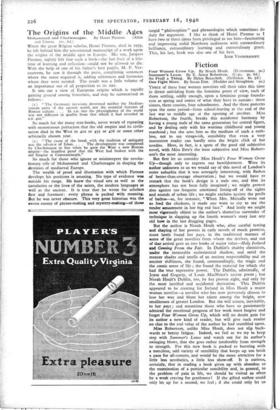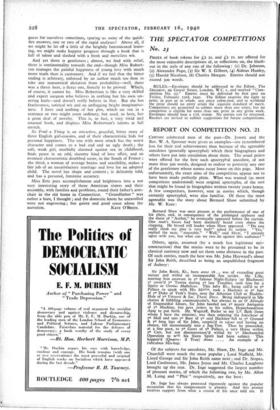Fiction
THREE of these four women novelists tell their tales this time in direct unfolding from the feminine point of view, each of them settling, oddly enough, upon a feminine group founda-
tion as spring and centre of what they have to narrate: three sisters, three cousins, four schoolmates. And the three patterns span the same period—from school-leaving at the end of the last war to middle age at the opening of another. Miss Robertson, the fourth, breaks this accidental harmony by having a young male of the same generation for central figure, and by dealing only with his wartime childhood and young manhood ; but she uses him as the medium of such a ruth- less, not to say virago-ish, sensibility that even a very inattentive reader can hardly miss the bright click of her needles. Here, in fact, is a spate of the good old subjective novel, with Miss Ertz's the least subjective and Miss Robert- son's the most interesting.
But first let us consider Miss Hoult's Four Women Grow Up—though only to express our bewilderment. Were its author unknown to us we would say of this novel of London's outer suburbia that it was averagely interesting, with flashes
of better-than-average observation ; but we would have to remark that the book's design is a stale one, and that its atmosphere has not been fully imagined ; we might protest also against too frequent emotional listing-off of the sights and sounds of urban life ; we might exclaim against the perils of bathos—as, for instance, " When Mrs. Metcalfe went out
to feed the chickens, it made one want to cry to see the tender amusement in her big red face." And lastly we might most vigorously object to the author's shameless surrender of technique in slapping up the fourth woman's story just any old how in the last dragging pages.
But the author is Norah Hoult who, after careful testing and shaping of her powers in early novels of much promise,
more lately found her pays, in the traditional manner of some of the great novelists from whom she derives, and out of that arrival gave us two books of major value—Holy Ireland and Coming From the Fair. In Dublin's shabby classicism, under the inexorable ecclesiastical shadow, and amid the meaner shades and smells of an ancient respectability and an ancient shiftiness, she found, commandingly, the tragic and the comic sense of life ; she found the material for which she had the true expressive power. The Dublin, admittedly, of Joyce and Gogarty, of Louis MacNeice's recent poem ; but North Hoult's Dublin, too, by her proven right, and only by the most justified and accidental derivation. This Dublin appeared to be creating for Ireland in Miss Hoult a major woman novelist—a novelist who has now perversely chosen to lose her way and blunt her talent among the bright, new smallnesses of greater London. But she will return, inevitably, to her pays; and meantime those who have so passionately admired the emotional progress of her work must forgive and forget Four Women Grow Up, which will no doubt gain for its author a new kind of reader, but will give such reader
no clue to the real value of the author he had stumbled upon. Miss Robertson, unlike Miss Hoult, does not slip back- wards or betray fatigue. Indeed, we feel as we try to keep step with Summer's Lease and watch out for its author's swinging blows, that she goes rather intolerably from strength to strength. For this new book is packed to bursting with a merdless, odd variety of sensibility that keeps up too brisk a pace for all-comers, and would be the more attractive for a little less acrobatics, a little less show-off. It is curious, certainly, that in reading a book given up with abandon to the examination of a particular sensibility and, in general, to the problem of pain in life, we should be visited so often by a weak craving for gentleness! If the gifted author could only let up for a second, we feel ; if she could only let us
guess for ourselves sometimes, sparing us some of the quick- fire answers, one or two of the rapid analyses! Above all, if we might be let off a little of the brightly fantasticated learn- ing, we might make happier progress through a book that is full of talent and slashed with a fresh and merciless wit.
And yet there is gentleness ; almost, we find with relief, there is sentimentality towards the end—though Miss Robert- son manages the painful happiness of young love with much more truth than is customary. And if we feel that the bitter ending is arbitrary, enforced by an author much too firm to take any nonsensical dictation from probability—well, there was a thesis here, a fierce one, fiercely to be proved. Which, of course, it cannot be. Miss Robertson is like a very skilled and expert surgeon who believes in nothing but his own un- erring knife—and doesn't really believe in that. But she has fearlessness, satirical wit and an unflagging bright imaginative- ness. I have said nothing of her plot, which set out in a sentence or two might seem ordinary, but used, as here, has a great deal of novelty. This is, in fact, a very vivid and unusual book, and displays Miss Robertson's talents at full stretch.
So Frail a Thing is an attractive, graceful, bitter story of three English girl-cousins, and of their characteristic bids for personal happiness. The one with most attack has the worst character and comes to a bad end and an ugly death ; the soft, weak girl, morbidly alarmed against sex in childhood, finds peace in an odd, slummy kind of love affair, and an eventual characteristic deathbed scene, in the South of France ; the third, a woman of average brains and sensibility, makes a fair job of an unsatisfactory marriage and love for an adopted child. The novel has shape and content ; is delicately told, and has a personal, feminine accuracy.
Miss Ertz puts accomplishment and brightness into a not very interesting story of three American sisters and their assembly, with families and problems, round their father's arm- chair in the old home in Connecticut. " Grandfather " was rather a bore, I thought ; and the domestic knots he unravelled were not engrossing ; but gaiety and good sense adorn the







































 Previous page
Previous page